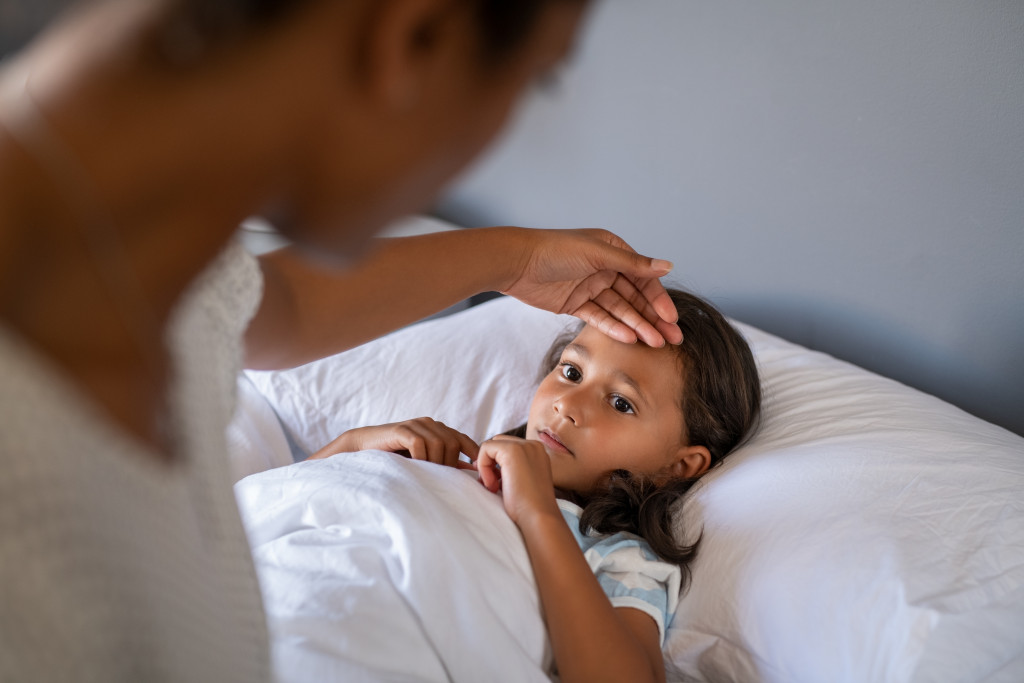- Pneumonia is a lung infection caused by various microorganisms, including bacteria, viruses, and fungi.
- Children with weak immune systems or preexisting medical conditions have a higher risk of developing pneumonia.
- Exposure to environmental factors such as air pollution, smoke, and allergens can increase the risk of pneumonia.
- Vaccines help reduce the risk of developing pneumonia.
- Good hygiene habits and a healthy diet can help prevent infections like pneumonia.
As a parent of young children, you may have noticed them coughing, having difficulty breathing, and high fever. These are telltale signs of pneumonia, a common illness among children. Pneumonia is a lung infection caused by various microorganisms, including bacteria, viruses, and fungi. It can be life-threatening and requires immediate medical attention. Here’s what you need to know about the disease, how your children might have it, and how to prevent it.
What is Pneumonia?
First, it’s essential to know what pneumonia is and why it’s so serious. Pneumonia is an infection of the lungs. Microorganisms can cause it, and it can cause inflammation in the air sacs of the lungs. Various reasons can cause it. Here are some of them:
Poor Immune System
A healthy immune system is essential to fighting infections, including pneumonia. Children whose immune systems are weaker are more susceptible to pneumonia. A weakened immune system can be due to various reasons, including a chronic medical condition, malnutrition, and premature birth. This highlights the importance of ensuring your child has a healthy diet and attends regular check-ups with their pediatrician.

Exposure to Infections
Children in daycare, school, and other group settings are at higher risk of developing pneumonia. This is because they are regularly exposed to cough, cold, and flu viruses that can lead to pneumonia. Some infections spread quickly, leading to outbreaks in schools and other institutions. As a parent, you can keep your child safe by ensuring they engage in proper hand hygiene and avoiding overcrowded spaces during flu season.
Environmental Factors
Exposure to environmental factors such as air pollution, smoke, and allergens can increase the risk of developing pneumonia. Smoking or exposure to secondhand smoke is a significant risk factor for children, and parents are advised to maintain a smoke-free environment. Additionally, indoor or outdoor pollution caused by industrial or car emissions can also contribute to the development of pneumonia.
Preexisting Medical Conditions
Children with preexisting medical conditions such as asthma, cystic fibrosis, and congenital heart disease are at higher risk of developing pneumonia. This makes it essential for parents of children with underlying medical conditions to partner with pediatricians to minimize the risk of developing pneumonia.
Poor Hygiene
Unhygienic habits can increase the chances of spreading pneumonia. It’s essential to teach children good hygiene practices, such as washing their hands, covering their mouth and nose when coughing or sneezing, and keeping their surroundings clean.
Dealing With Pneumonia
There are various ways to deal with and prevent pneumonia. Here are four effective ways to do that:

Have a Reliable Family Doctor
First, it’s important to have a reliable family doctor that can diagnose and treat pneumonia in your child. A doctor can provide the best care for your child and help you identify the underlying cause of the infection. Certain medical facilities like Crosspointe Medical Clinic have experienced family doctors who can help your child. Contacting these facilities can help introduce you to a doctor your family might like.
Receive Vaccines
Ensure your children are up to date with their vaccines, including flu, pertussis, and pneumococcal shots. These vaccines help to reduce the risk of developing pneumonia.
Practice Good Hygiene Habits
Ensure your children practice good hygiene habits, including washing their hands regularly and covering their nose and mouth when coughing or sneezing. Additionally, keep their surroundings clean and dust-free to reduce the risk of infection.
Maintain a Healthy Diet
Good nutrition is essential for optimal health and helps prevent infections like pneumonia. Ensure your child’s diet includes many fruits, vegetables, whole grains, healthy fats, and lean protein. This will support their immune system and help fight off any infections quickly.
Pneumonia is a severe illness that should not be taken lightly. Knowing the signs and symptoms can help you recognize them early on and get your child the medical attention they need. Additionally, taking preventive measures can help reduce the risk of your child getting pneumonia. Follow the tips above and partner with a reliable doctor if you notice any signs of pneumonia in your child. This way, your child can stay healthy for years to come.

